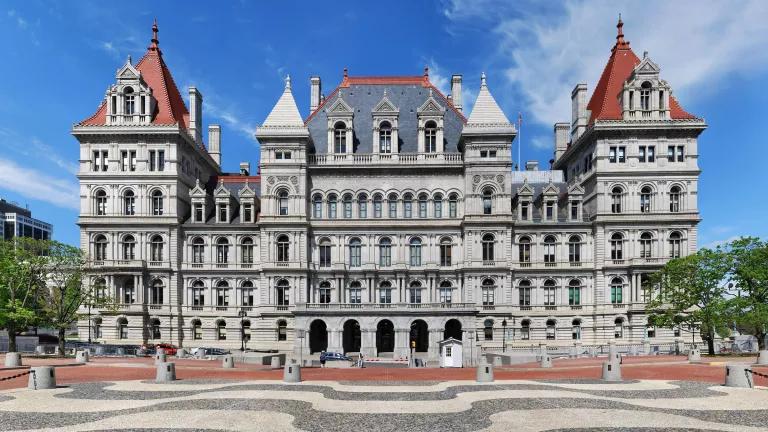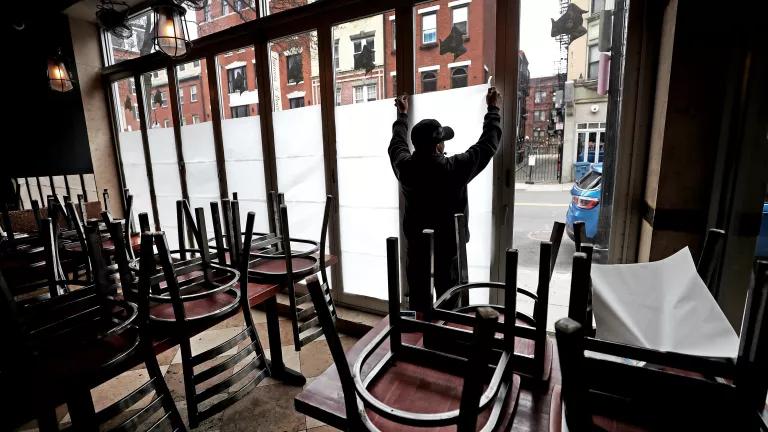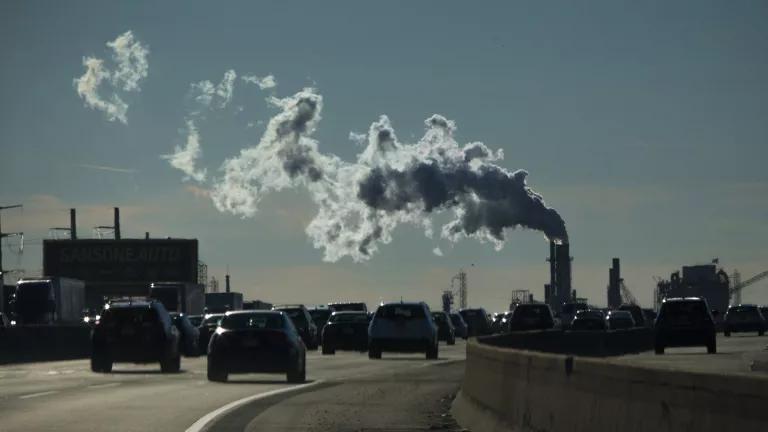New York State Legislative Session Wraps Up: What’s In and What’s Out?
In the wake of the 2024 New York legislative session, we highlight some key victories and grapple with challenging political roadblocks.

The New York State Capitol
Congestion pricing
The last week of the 2024 New York state legislative session, where many bills are voted on at session’s end, was upended by a stunning announcement by Governor Kathy Hochul to pause the congestion pricing toll plan “indefinitely.” Congestion pricing, which NRDC has supported for decades, would charge drivers entering Manhattan at 60th Street or below, $15 during peak traffic periods and $3.75 at night. Trucks would pay $24–$36 during peak period and $6–$9 overnight. The benefits of the plan, already adopted by other cities like London and Stockholm, would provide funding for the replacement of worn-out rail and signal equipment, drastically reducing delays; finance a fleet of electric buses; increase funding to the Long Island and Metro-North railroads; and support major improvements in security and safety programs.
By removing an estimated 100,000 vehicles from the central business district, the tolling plan would unsnarl midtown’s notorious traffic congestion and dramatically improve the area’s air quality, a major public health benefit. Hochul’s pause also created a $1 billion hole in the Metropolitan Transportation Authority (MTA) budget, which has to be filled. Critical initiatives like the NY HEAT Act, a gas stove labeling bill, and other legislation that would aggressively limit plastic waste pollution (described below) were buried beneath the announcement of this dramatic policy shift.
Two important bills that did pass both houses this legislative session were the Climate Change Superfund Act and the “Good Food NY” bill. And while others did not, there may be a second bite of the apple in July if the legislature returns for a special session to address the MTA budget crisis.
The Climate Change Superfund Act
The Climate Change Superfund Act passed both houses and will soon go to Governor Hochul’s desk. This bill is a big win because it will place the fossil fuel industry—which is still driving the climate crisis by generating more than a billion metric tons of carbon dioxide—on the hook for climate damages and require fossil fuel polluters to pay for the costs associated with climate change. The Climate Change Superfund Act creates a 25-year dedicated fund that will raise $3 billion annually, with one-third of the funds reserved for the disadvantaged communities that are disproportionately impacted by the climate crisis. The funds will also be invested in climate resiliency projects like coastal resiliency, renewable energy facilities, and green infrastructure. New York is only the second state to pass such a law, with Vermont leading the way.
Good Food NY
The New York State Legislature passed a first-of-its-kind state legislation that could help transform the way cities and towns purchase food for public schools, child and senior care centers, hospitals, and other municipal institutions. The Good Food NY bill (Senate Bill 6955A/Assembly Bill 7264A), which still needs to be signed by Governor Hochul to become law, removes archaic statutory obstacles so that localities can use their public dollars to buy healthier and more sustainably and equitably produced food. The bill will also make it easier for municipalities to purchase food from local farms, which often struggle to survive economically. Passage of this bill reflects more than three years of work by a 70-plus group coalition led by Community Food Advocates and the Good Food Buffalo Coalition that encompasses environmental, animal, public health, labor, and local farm advocates. The bill’s prime sponsors were Crystal Peoples-Stokes, the majority leader of the New York State (NYS) Assembly, and Michelle Hinchey, an NYS state senator who chairs the Committee on Agriculture. If enacted, the bill will make New York a national leader in the movement for values-based good food purchasing.
PFAS
In the 2024 legislative session, NRDC and partners formed the PFAS-Free NY coalition and called for the passage of a package of bills that would have reduced human exposure to toxic per- and polyfluoroalkyl substances (PFAS) in our homes, helped addressed continuing threats of PFAS-contaminated drinking water supplies, and provided greater transparency on where PFAS contaminated effluent is entering the environment. This package included:
- SB5648F/AB3556A, a bill to eliminate PFAS in key consumer and household products, like dental floss, cookware, ski wax, textiles, and more;
- The Beauty Justice Act (SB4265B/AB6969B), a bill that would eliminate PFAS and other toxic chemicals in personal care and cosmetic products;
- SB3529A/A05990, a bill to eliminate PFAS and other toxic products in menstrual products; and
- The PFAS Discharge Disclosure Act (SB227B/AB3296A), a bill that would require the testing of industrial and wastewater discharges released into waterways for the presence of PFAS chemicals.
This package of bills recognizes that protecting people and the environment from PFAS exposure and contamination begins with the elimination of nonessential uses of PFAS that can be found in everyday items. PFAS accumulate in humans and the environment and are extremely resistant to breaking down. The use and manufacturing of products with added PFAS chemicals puts New Yorkers’ health at risk and can lead to drinking water contamination.
Though SB5648F/AB3556A (elimination of PFAS in key consumer and household products) and SB3529A/A05990 (elimination of PFAS and other toxic chemicals from menstrual products) unanimously passed the Senate, these bills were ultimately not brought to a vote in the Assembly. Additionally, we faced political opposition to the inclusion of cookware in SB5648F/AB3556A at the eleventh hour. Ultimately, cookware came out of the bill, but that will not stop advocates from fighting for its inclusion in the future.
The Beauty Justice and PFAS Discharge Disclosure acts failed to advance out of committee in either house.
If the legislature convenes for a special session this summer, SB5648F/AB3556A and SB3529A/A05990 will be a top priority to get over the line.
Plastics
This session has been a roller coaster for the Packaging Reduction and Recycling Infrastructure Act (SB4246B/AB5322D), which ultimately passed the Senate but was not brought to a vote in the Assembly. This bill would’ve been the strongest bill of its kind in the nation: requiring a reduction in all plastic packaging by 30 percent by 2012; banning toxic chemicals currently used in packaging, such as PFAS, vinyl chloride, and formaldehyde; incentivizing companies to use more sustainably and recyclable packaging materials; providing funding for municipal recycling programs to reduce the burden on taxpayers; and preventing the plastics industry's favorite false solution of "chemical recycling" from counting as recycling. The rumored special session may present an opportunity for the Assembly to vote on this important policy.
NY HEAT
The Senate passed the New York Home Energy Affordable Transition (NY HEAT) Act in both the 2023 and 2024 sessions, but the Assembly did not move to pass it before the end of this session. NY HEAT would make New York a leader in the nation for removing utilities' legal “obligation to serve” its customers with gas. The act would also eliminate the “100-foot rule,” which requires current gas customers to subsidize the costs of extending gas infrastructure to hook up new customers. These provisions have been a public service law barrier to achieving the goals of the 2019 Climate Leadership and Community Protection Act. This would be a huge win for consumers and for a clean energy transition because it would allow utilities to invest in clean alternatives rather than continuing to require New Yorkers to pay for replacing 7,000 miles of old gas pipes and nearly 190,000 old gas service connections to buildings at a cost of more than $150 billion. New York State must downsize its gas infrastructure system to maintain affordability for consumers, reduce air pollution both indoors and out, and make progress on achieving its climate goals. The next chance for NY HEAT to be considered will likely be in the new legislative session at the start of 2025.
Healthy Homes Right to Know Act
The Healthy Homes Right to Know Act was also a victim of the congestion pricing tumult. This bill would require that gas stoves sold in New York State have affixed on the stove or its packaging a public health warning label indicating that its four known emissions—carbon monoxide, nitrogen dioxide, formaldehyde, and benzene—can cause negative public health impacts. There would also be a required warning sign at the point of purchase. Most consumers are unaware of these dangers and most retailers routinely fail to inform them. These labels are similar to many that are already required in New York, such as for the sale of alcohol or cigarettes. New York already requires similar labels on unvented gas heaters.
The Fashion Act
The Fashion Act was also stymied. The $2.5 trillion apparel industry has an enormous environmental footprint. The industry is responsible for between 6 to 8 percent of global greenhouse gas emissions, equal to the entire aviation industry, and it is largely unregulated. The Fashion Act would cover apparel or footwear companies that have more than $100 million in global revenue. The bill would mandate that these large fashion brands know and disclose their supply chains, then draw down their negative climate impacts. The regulations would require that the companies set and achieve climate reductions in line with the Paris Agreement.
These bills might have another bite of the apple. If there is a special session called by either the governor or the legislative leadership—and the $1 billion hole in the MTA budget will be a driving force to hold one—advocates will work hard to ensure these bills get passed out of the legislature.


